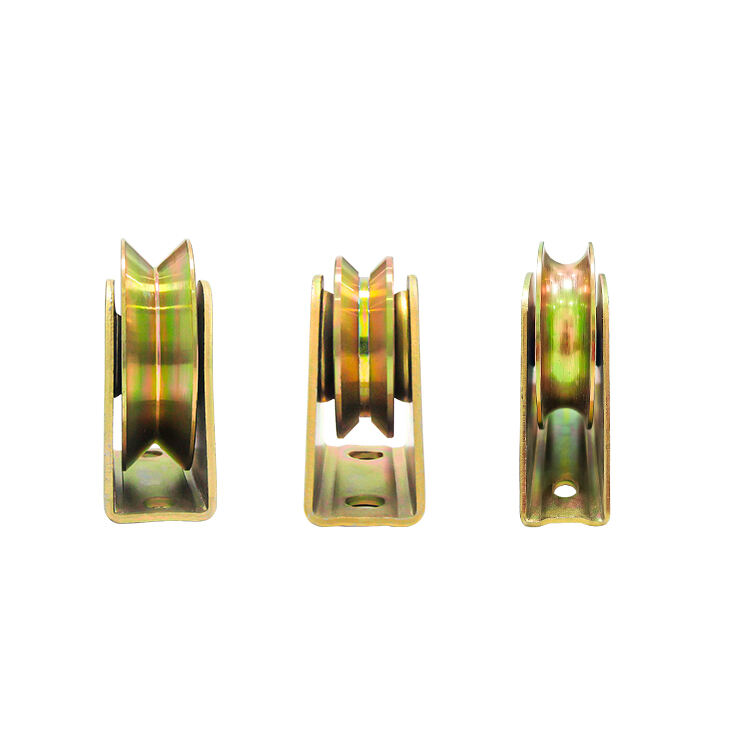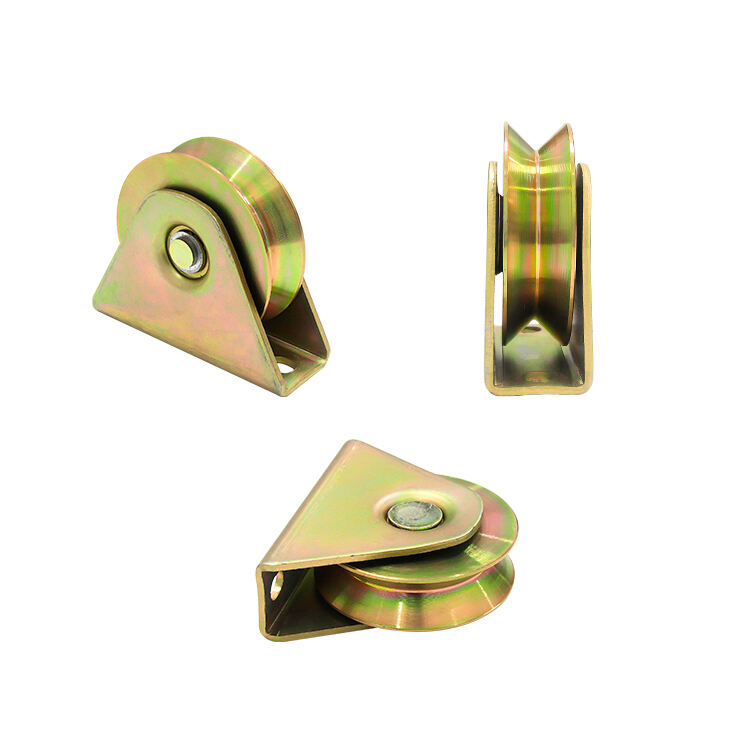Types of Industrial Rollers and Their Critical Functions
Drive Rollers: Powering Motion Transmission
Drive rollers form an important part of conveyor system operation, helping power the movement needed throughout these systems. These components keep materials moving smoothly and efficiently through factories, warehouses, and other industrial environments. Conveyor systems just wouldn't work without them really. Manufacturers often need drive rollers in various sizes and load capacities depending on what they're transporting and where. The real advantage comes from how these rollers connect to electric motors, which gives them enough torque to actually move things along the conveyor belt. This setup means materials stay in motion consistently without stopping or jamming, something that keeps production lines running smoothly day after day in manufacturing plants around the world.
Guide Rollers: Precision Directional Control
Guide rollers are essential for keeping materials moving exactly where they need to go along conveyor belts, which makes the whole system work better. They cut down on friction so there's less damage happening to both the rollers and whatever is passing through them. Less friction means materials stay intact longer while the rollers themselves last much longer too, saving money in the long run. Adjustable versions of these guide rollers give companies real freedom when designing their conveyor setups. Factories can tweak things around depending on what fits best in their particular workspace or production needs without major rework.
Conveyor Rollers: Backbone of Material Handling Systems
Conveyor rollers form the foundation of most material handling systems, supporting and moving products efficiently along production lines day after day. Available in different configurations such as gravity feed models, motor driven versions, and flexible modular setups, these components adapt well to almost any industrial need. Manufacturing plants, warehouses, and distribution centers all rely on conveyor roller systems to keep operations running smoothly without bottlenecks. Proper upkeep matters a lot too. Regular inspections, lubrication checks, and timely replacement of worn parts significantly extend roller life while cutting down unexpected stoppages. Companies that invest in routine maintenance programs typically see better productivity metrics and fewer headaches when it comes to keeping materials flowing through their facilities.
5 Reasons High-Quality Rollers Impact Business Operations
Preventing Costly Production Downtime
Good quality rollers really help cut down on production stoppages since they just don't break down as often. When machines actually do fail, companies lose money fast from all that lost time. Some places have reported losing thousands because of equipment problems. So investing in dependable rollers makes sense for any business looking to avoid those headaches. And let's not forget about regular checkups either. A little maintenance goes a long way toward keeping those expensive systems running properly for years instead of months. Most manufacturers find that sticking to a maintenance schedule keeps everything moving smoothly without surprises popping up when least expected.
Protecting Heavy-Duty Equipment from Premature Wear
Rollers built to handle heavy loads are essential for keeping industrial equipment running longer before it starts showing signs of wear. When companies spend money on good quality roller systems upfront, they end up spending less over time because their machines don't need replacing so often. Maintenance costs drop significantly as well. Research across manufacturing sectors shows there's a clear link between how durable those rollers are and how long the whole system lasts. Factories using top grade rollers report fewer breakdowns and better overall performance from their production lines. Some plants even see a 30% reduction in downtime after upgrading their roller components.
Ensuring Consistent Product Quality Output
Keeping product quality consistent matters a lot in manufacturing operations. Good quality rollers make all the difference when it comes to how materials get handled across production lines. When rollers don't perform as they should, this often results in product flaws ranging from surface blemishes to structural weaknesses. These issues hurt customer happiness and might even harm what people think about the company's overall brand image over time. Most manufacturers know this well enough to put serious effort into selecting rollers through rigorous testing protocols. Some actually run trial batches just to see how different roller options hold up under actual working conditions before making final purchases.
Reducing Maintenance Costs Over Time
When companies invest in good quality rollers, they often see lower maintenance bills down the road. Better rollers just don't need fixing as often, so money saved on repairs goes straight into the bottom line while operations run smoother too. The materials matter a lot here. Rollers made from tougher stuff last longer before needing replacement or repair work. This actually saves cash in the long haul. Looking at all the costs involved when picking out roller systems isn't just smart business it's essential for getting the most bang for buck. Companies that take this approach free up capital that would otherwise go toward constant fixes, letting them reinvest in expanding their operations instead.
Enhancing Safety in Automated Systems
When it comes to automated systems, safety should always be at the top of the priority list. Good quality rollers play a big role in reducing the risk of mechanical breakdowns that can lead to serious problems on the production floor. Most industrial safety regulations actually require certain durability standards for these components, which means keeping those rollers in good shape isn't just smart business practice—it's practically law. Companies that spend money on dependable roller systems see fewer accidents happening, obviously. But there's another side to this too: workers feel better knowing their equipment won't fail unexpectedly, and that kind of confidence makes a real difference in day-to-day operations across manufacturing facilities everywhere.
Material Matters: Durability in Roller Construction
Urethane vs Rubber: Weatherproof Solutions for Extreme Conditions
When deciding between urethane and rubber rollers for weatherproofing in tough conditions, the choice really matters. Urethane stands out because it resists wear much better than rubber does, plus it handles extreme heat and cold without breaking down. The reason? Urethane's solid construction makes it work well whether installed near desert ovens or frozen warehouse floors. Rubber just doesn't last as long when exposed to such extremes though. Companies that take time to look at how materials perform across different temperature ranges usually end up picking the right option for their specific needs. Getting this right means smoother operations over time and fewer replacements down the road, which saves money in the long run.
Heavy-Duty Sliding Gate Components: Motor Compatibility
Getting the right roller parts matters a lot when it comes to making sure heavy duty sliding gates work properly. When rollers match up correctly with motors, everything moves better and breakdowns happen less often. Good quality rollers fit into these gate systems nicely, improving both how they function day to day and keeping people safe around them. Businesses know this because reliable parts mean their gates slide open and close without problems, cutting down on maintenance time and saving money in the long run. For companies depending on automated security solutions, having all these components work together right is pretty much essential if they want to keep operations running smoothly while maintaining good control over access points.
Specialized Coatings for Chemical/UV Resistance
Specialized coatings on rollers really make a difference when it comes to how long they last, particularly in places where they're constantly hit by harsh chemicals or UV exposure. The right coating acts as a shield against wear and tear, which means the rollers stay functional longer before needing replacement. For industries dealing with things like acids or saltwater all day long, getting corrosion resistant rollers isn't just smart it's practically necessary for keeping operations running smoothly. When companies invest in coated rollers, they're not only saving money over time but also staying compliant with safety regulations while their equipment keeps performing well under tough conditions. This approach shows real understanding of what works in demanding industrial settings where reliability matters most.
Industry-Specific Applications of Precision Rollers
Automatic Sliding Gate Opener Systems
Precision rollers are really important for making sure automatic sliding gates work properly. These components allow gates to move smoothly and consistently, which is vital for controlling access in places ranging from apartment buildings to office parks. When installed correctly, sliding gates depend heavily on good quality rollers to keep functioning day after day without constant problems or breakdowns. Regular checks and proper upkeep of roller systems means businesses won't face unexpected stoppages that cost money and time. Well maintained gates stay secure longer while reducing risks for everyone using them. Most property managers find that taking care of these mechanical parts pays off in both safety improvements and fewer repair bills down the road.
Manufacturing Line Conveyor Solutions
Rollers on conveyor lines have become essential components in manufacturing settings because they can handle all sorts of different production requirements. When it comes to precise sorting, moving materials around, and putting things together, these specialized rollers make a real difference in how efficiently a factory runs. Integrating them properly into the manufacturing process helps keep everything flowing smoothly without hiccups, which naturally improves the quality of what gets produced. Any plant looking to maximize its output will find that good quality precision rollers are basically the foundation of reliable conveyor systems. They let companies keep up with production schedules consistently while maintaining fast turnaround times.
Heavy-Duty Door Hinge and Wheel Assemblies
Industrial strength door systems come with their own set of headaches, requiring solid hinges and robust wheel assemblies that can take a beating over time. When it comes to roller design, getting this right really matters because poor quality means doors will fail sooner rather than later, especially in places where they need to work nonstop day after day. Factory managers know this all too well from experience. Proper quality checks during manufacturing help prevent premature failures, saving money on constant repairs and minimizing production stoppages when doors go down unexpectedly. Companies that invest in good quality precision rollers typically find their heavy duty doors last longer and function better without those annoying jams or misalignments that slow everything down.
Selecting Reliable Roller Suppliers: Key Considerations
Certifications and Quality Assurance Protocols
Finding trustworthy roller suppliers starts with looking at what certifications they have and how solid their quality control processes are. Companies with ISO 9001 or similar certifications show they take quality seriously and follow established industry standards. Such certifications cover everything from raw material sourcing to final product testing, giving buyers peace of mind that what arrives meets specifications. Good quality assurance systems act as a safety net too, catching any potential issues before defective products reach customers. The supplier qualification process matters just as much though. When this documentation exists and is thorough, it makes life easier for operations teams dealing with multiple industries needing consistent quality over time. Working with suppliers who get all these points right leads to better performing roller systems in the long run.
Custom Engineering Capabilities
When looking for roller suppliers, the capacity to deliver custom engineering really matters. Companies that offer tailored engineering services can adjust their products to suit what different industries actually need, making operations run better overall. Custom work means changing designs based on what clients ask for, and this makes a big difference in how rollers perform in niche applications. Working closely with engineering staff leads to new ideas and smarter ways to build products that match exactly what customers want. These kinds of collaborations help produce rollers that just work right in specific settings, boosting effectiveness across the board. The best suppliers in this area stand out because they know how to tweak solutions so they fit exactly what each customer needs, not just what works generally.
Proven Performance in Your Industry
Finding trustworthy roller suppliers starts by checking what kind of certifications they have along with how serious they are about quality control. Companies holding certifications such as ISO 9001 usually show they care about meeting standard requirements in their industry. Such credentials mean they follow proper procedures throughout manufacturing processes, material selection, and product testing so customers can trust the final product meets quality expectations. Look for vendors who've been around awhile and have good reviews from others in similar businesses. These experienced suppliers tend to understand special requirements better, which cuts down on unexpected problems during operations while keeping materials coming in consistently without hiccups.




